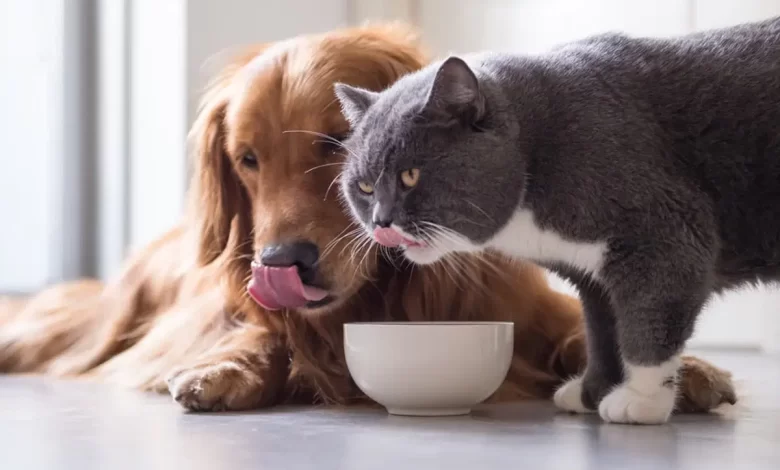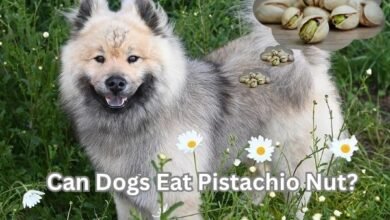
Is it bad for dogs to eat cat food? Many pet owners have caught their dogs sneaking bites from the cat’s bowl and wonder if it’s harmless or dangerous. While an occasional nibble may not cause immediate harm, regular consumption of cat food can lead to serious health problems in dogs. Since cat food is specifically formulated to meet the nutritional needs of felines, it is significantly different from dog food and lacks the balance that dogs require.
Feeding cat food to dogs, even unintentionally, can lead to digestive issues, obesity, pancreatitis, kidney disease, and other long-term health complications. This article will explore that- Is it bad for dogs to eat cat food and the short- and long-term effects of dogs eating cat food and provide tips on preventing your dog from consuming it.
Why Do Dogs Love Cat Food?
Dogs often seem obsessed with cat food, and there are scientific reasons behind their attraction:
✔ Higher Protein and Fat Content – Cat food is designed for obligate carnivores (cats), meaning it contains more animal-based proteins and fats than dog food. Dogs love the rich taste and texture.
✔ Stronger Aroma – The meat-heavy formula of cat food emits a stronger smell than traditional dog kibble, making it more appealing to dogs.
✔ Different Texture – Wet cat food is soft and flavorful, while dry cat food is crunchier and more palatable.
✔ Easy Access – If cat food is left out all day, dogs see it as an easy snack and will take advantage of the opportunity.
Although dogs may love cat food, it is not a safe or balanced option for them. Over time, consuming cat food can cause severe health complications.
Short-Term Effects of Dogs Eating Cat Food
If your dog eats cat food occasionally, you might notice some immediate effects. The high fat and protein content can upset their digestive system and cause:
1. Digestive Issues
Since cat food is richer than dog food, it can cause stomach discomfort in dogs. Symptoms may include:
✔ Diarrhea – The high fat content in cat food can lead to loose, frequent stools.
✔ Vomiting – Some dogs experience nausea and vomiting due to the richness of cat food.
✔ Gas and Bloating – A lack of fiber in cat food can cause irregular digestion and stomach discomfort.
2. Increased Thirst & Urination
- The excess protein and fat in cat food can cause dehydration, leading to increased water consumption and frequent urination.
3. Loss of Appetite for Dog Food
- Dogs that frequently consume cat food may refuse to eat their own food, leading to nutritional deficiencies.
If your dog eats a small amount of cat food once, it’s not an emergency. However, if they consume it regularly, more serious problems can arise.
Long-Term Effects of Dogs Eating Cat Food
If a dog eats cat food over an extended period, serious health complications can develop. Here are the major risks:
1. Obesity & Weight Gain
Cat food is significantly higher in calories and fat than dog food. Over time, this can lead to rapid weight gain and obesity, which increases the risk of:
✔ Diabetes – Obesity is a major risk factor for diabetes in dogs.
✔ Joint Problems – Extra weight puts stress on joints, leading to arthritis and mobility issues.
✔ Heart Disease – High fat intake can lead to cardiovascular problems and high blood pressure.
2. Pancreatitis: A Deadly Risk
A high-fat diet is one of the leading causes of pancreatitis, a painful and potentially life-threatening condition. Signs of pancreatitis include:
✔ Loss of appetite and refusal to eat
✔ Severe vomiting and diarrhea
✔ Lethargy, weakness, and dehydration
✔ Abdominal pain and sensitivity
Pancreatitis requires immediate veterinary care and can result in long-term digestive system damage.
3. Kidney and Liver Damage
Excessive protein consumption from cat food can overwork a dog’s kidneys and liver, leading to chronic kidney disease or liver dysfunction. Symptoms of organ strain include:
✔ Increased thirst and urination
✔ Loss of appetite and weight loss
✔ Lethargy and muscle wasting
✔ Potential kidney failure over time
4. Nutritional Deficiencies & Imbalances
Dogs have specific dietary needs that cat food does not meet. Feeding a dog cat food long-term can lead to deficiencies, including:
✔ Lack of Fiber – Leads to digestive issues such as constipation or irregular bowel movements.
✔ Vitamin & Mineral Imbalances – Cat food contains more vitamin A, which can be toxic to dogs in large amounts.
✔ Inadequate Carbohydrates – Dogs require carbohydrates for energy, which are largely absent in cat food.
✔ Calcium-Phosphorus Imbalance – Too much phosphorus and too little calcium can lead to weakened bones and fractures.
How to Stop Your Dog from Eating Cat Food
If your dog frequently gets into the cat’s food, take these steps to prevent the behavior:
✔ Feed Pets in Separate Areas – Keep your cat’s food in a high location or a separate room with a baby gate.
✔ Use an Automatic Feeder – Microchip-activated feeders prevent dogs from accessing cat food.
✔ Train Your Dog – Teach commands like “leave it” and reward them for ignoring cat food.
✔ Remove Leftover Cat Food – Feed your cat at set times and remove uneaten food immediately.
✔ Provide a Satisfying Dog Diet – Ensure your dog eats high-quality, protein-rich dog food to prevent cravings for cat food.
Healthy Alternatives to Cat Food for Dogs
If your dog craves cat food, offer nutrient-rich alternatives that meet their dietary needs:
✔ Lean Meats – Cooked chicken, turkey, or beef.
✔ Eggs – A protein-rich, digestible food that is safe in moderation.
✔ Pumpkin or Sweet Potato – Fiber-rich foods that aid digestion and promote gut health.
✔ Dog-Specific High-Protein Kibble – Look for dog food with real meat as the first ingredient.
✔ Dog-Friendly Wet Food – If your dog prefers wet food, choose a high-protein canned dog food formulated for canine needs.
✔ Yogurt or Cottage Cheese – Provides protein and probiotics to support digestion.
Final Verdict: The Short & Long-Term Effects of Dogs Eating Cat Food
Is it bad for dogs to eat cat food? The short answer is yes—while an occasional bite won’t cause harm, regular consumption can lead to severe health risks such as obesity, pancreatitis, kidney strain, and digestive problems.
To keep your dog healthy, prevent access to cat food and ensure they stick to a nutritionally balanced dog diet. If your dog has eaten cat food frequently or is showing signs of illness, contact your veterinarian immediately for professional advice.



